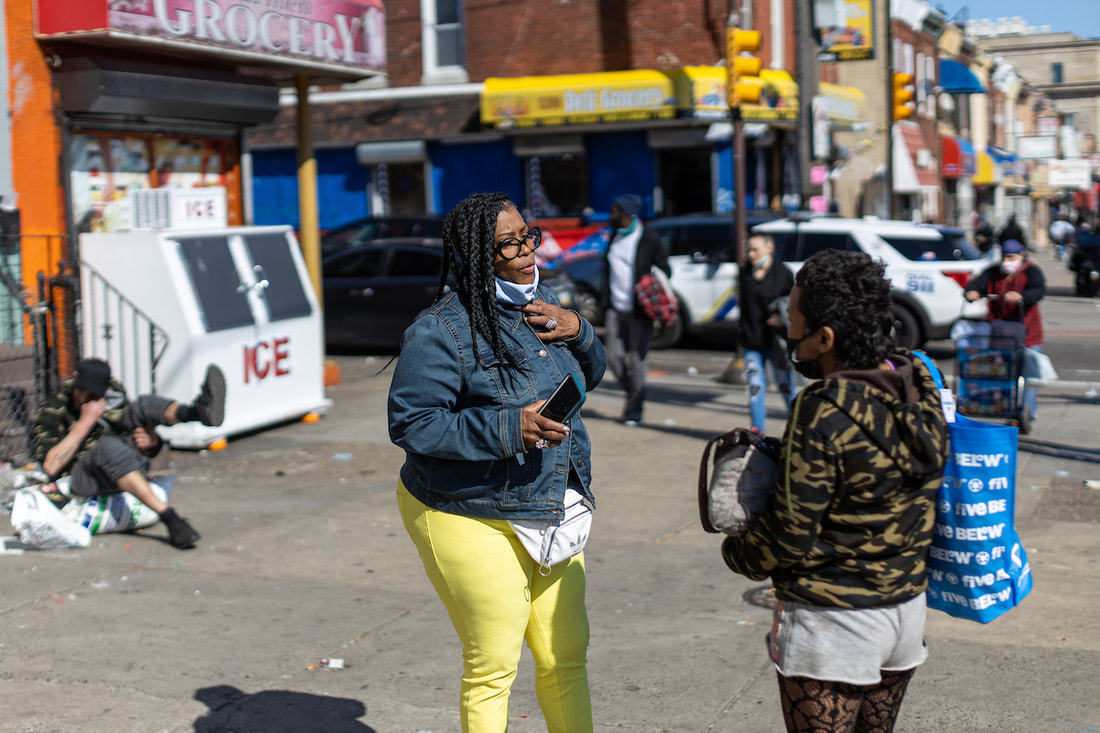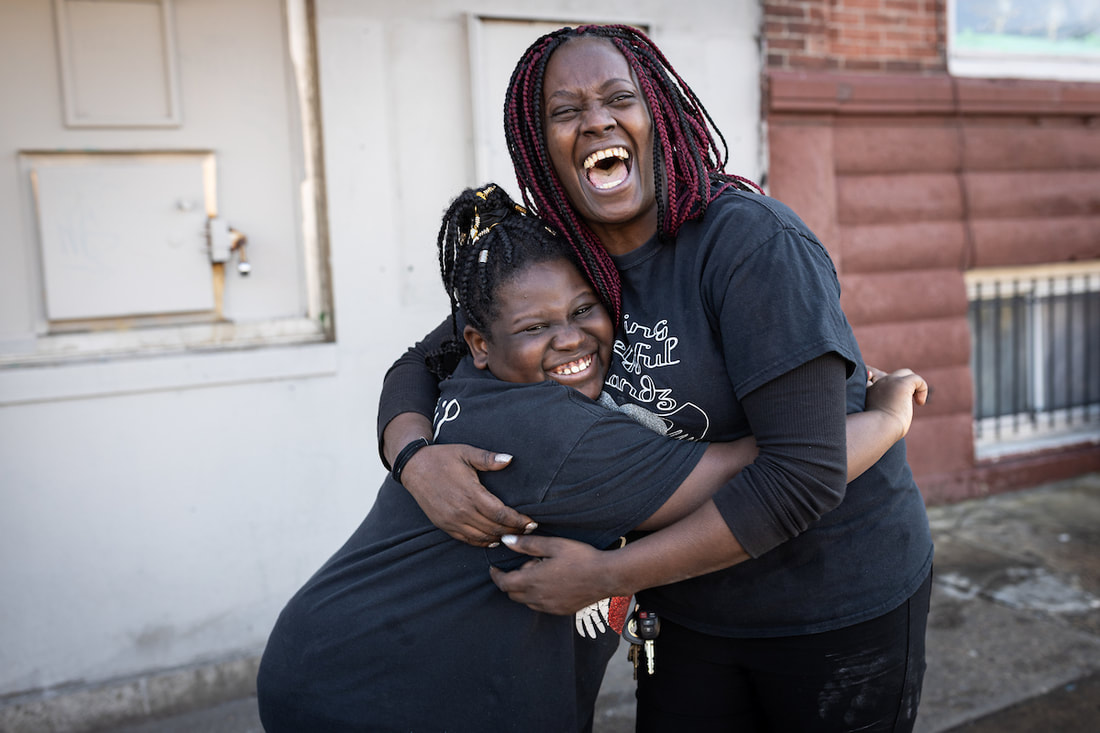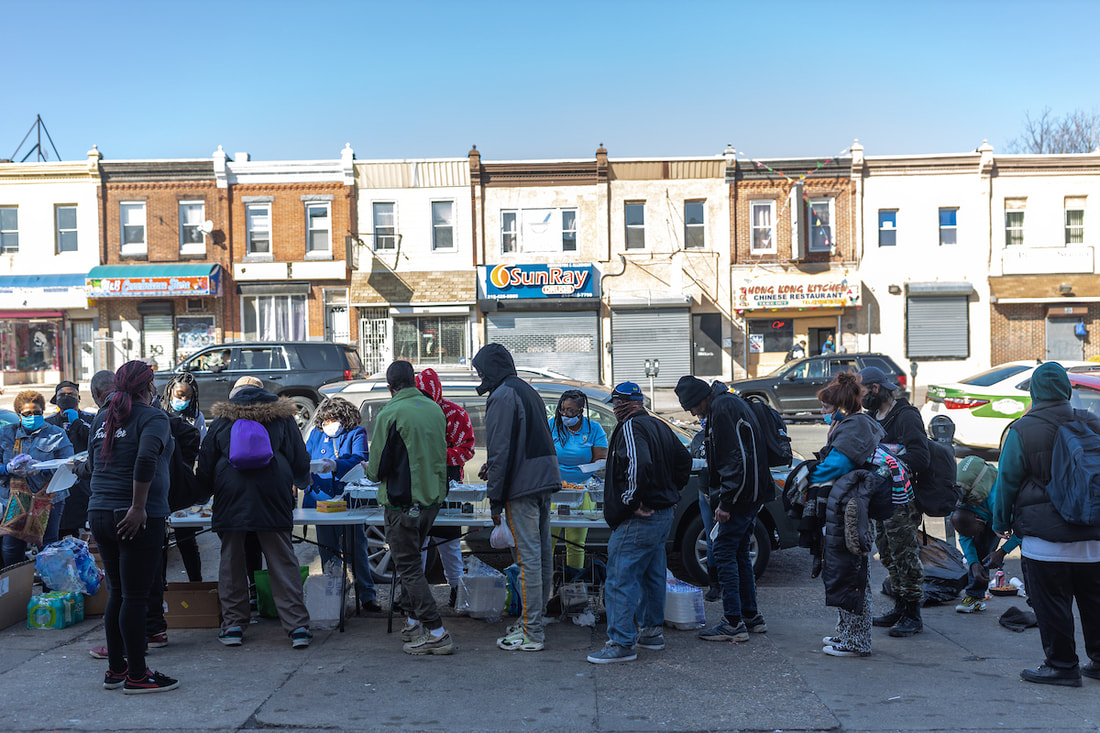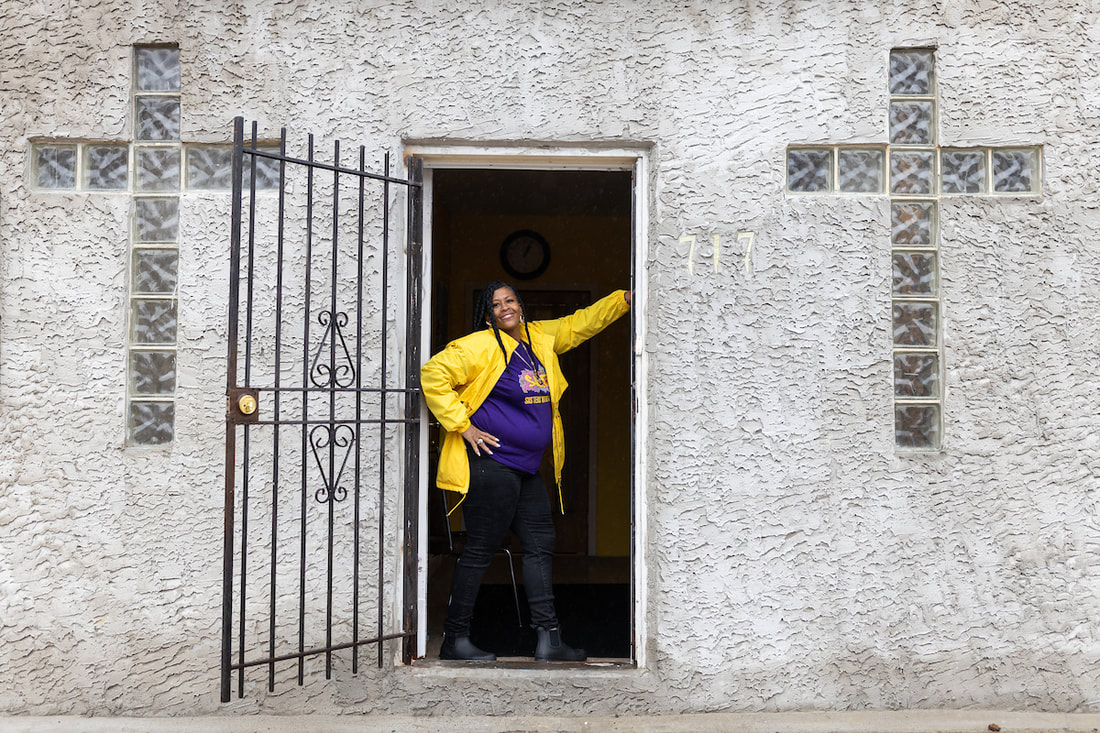|
Click the “play” icon on the image above to watch a short film about Why Not Prosper. On a chilly spring morning in Philadelphia, Michelle Simmons unlocks the door to the building she owns on Chelten Avenue, not far from her old middle school. She owns three buildings in Germantown, actually. More accurately, her nonprofit owns them. But Simmons and her organization, Why Not Prosper, are basically synonymous. Once inside the building, she moves quickly, flipping light switches, sorting paperwork, stuffing goodie bags, talking herself through each to-do. She tackles detail after detail, always moving forward, building her dream to help formerly incarcerated women like herself. Twenty years ago, Simmons had no keys. Instead of unlocking doors for women, doors closed in her face, just as she wanted to charge ahead. “As I was reentering society, I ran into barrier after barrier after barrier,” she says. “I got tired of people telling me no.” After serving six years on and off in the California Institute for Women, Simmons was released in 1999. She left prison determined to rebuild her life, but felony convictions for possession, prostitution, and receiving stolen property followed her everywhere. Simmons wanted to regain custody of her children, but she needed stable housing and steady employment before a judge would consider it. When government housing turned her away, she found a church in Norristown willing to give her a room. “It was in that house that God said: open up a program for women coming from prison,” she says. “That’s where Why Not Prosper was born. In that house, on that day.” Michelle Simmons, founder of Why Not Prosper, hands out brochures on E. Allegheny Avenue in Kensington, an area with high concentrations of homelessness and opioid addiction. Simmons wants women to know about the services offered by Why Not Prosper, in case they want to seek help, or know someone who does. Today, Why Not Prosper has helped 10,000 women, Simmons estimates, through its residential program, hotline, and resource library. Across its three properties, the organization offers 25 beds to formerly incarcerated women who need a place to land after living months, years, or sometimes decades behind bars. “I’ve seen thousands of women’s lives change,” Simmons says. “I’ve seen the women whose lives change reach back and grab another woman’s hand and bring them to the program and say, ‘This is where you need to be. This is where you’re going to get your help from.’” Women in Why Not Prosper’s residential program find a supportive community where they receive trauma-informed therapy, attend 12-step recovery meetings, and help each other navigate the maze of obstacles that perplex and frustrate many of the 600,000 people released from prisons each year. These obstacles exist in nearly every pocket of society. Employers rarely hire people with criminal convictions. Voting is off limits. So are public benefits, public housing, and student loans. The road back to society comes with added challenges for women, particularly mothers. “Women have very specific needs,” says Ann Schwartzmann, coordinator for the Inside-Out Prison Exchange Program at Temple University, and a supporter of Why Not Prosper. “It’s not necessarily like men coming home because women often have children to take care of or maybe their parents.” While women comprise only a small portion of the US prison population — less than 7 percent, according to the Federal Bureau of Prisons — the number of women in prisons has climbed steadily since 1980, by a factor of seven. There are approximately 1.2 million women currently living inside the US criminal justice system, according to The Sentencing Project, and more than 60 percent are mothers to children under 18. Black women have disproportionately felt the impact of rising incarceration rates over the past four decades. They’re nearly twice as likely as White women to go to prison. The rate is higher among Black girls, who are three times more likely than White peers to be placed in correctional institutions. While women and girls are significantly impacted by incarceration, their lower numbers in prisons and jails — relative to men — has meant fewer resources and supports, says Darryl Vereen, chair of Why Not Prosper’s board of directors. “Black males have been under attack in the justice system for a long time, so there has been a response to give that support,” he says. “Typically you hear about a lot of reentry and recovery programs that are male-focused. To see one that is thriving and doing well for women — it’s encouraging.” April Lee, a graduate of Why Not Prosper’s residential program, hugs her nine-year-old daughter LeeAnn Veney. “It’s an uphill battle, not only to get your children back, but to change your reputation and the way people see you,” Lee says. She now works in a role helping parents navigate the child welfare system. At a March get-together in Why Not Prosper’s main building — its first since the COVID-19 outbreak — nearly 30 women gathered in a bright yellow room for what Simmons calls the Sister Circle. It’s a time for women in the program to connect with graduates, share stories and experiences, and learn from one another. A catered buffet served shrimp and grits, an art therapist led a creative activity, and the women discussed what hindered and helped them since leaving incarceration. Many sang the praises of Why Not Prosper in helping them overcome their past and create better lives for themselves and their families. On this day, Simmons asked the Sister Circle to talk about probation (a sentence imposed after conviction) and parole (monitoring assigned after incarceration), which keep many formerly incarcerated people under the supervision of the criminal justice system long after they’ve left confinement. “I’m getting texts and calls [from the Department of Corrections] that say this is a violation,” said one woman speaking to the group. “That right there was enough for me to just say I don’t care, I don’t want to do this anymore. I don’t want to get clean anymore. That was enough to make me run.” While many people perceive parole and probation as a means of keeping people out of prison, a 2019 report from the Council of State Governments shows that technical violations of parole and probation, like missing appointments with supervising officers or failing drug tests, account for almost a quarter of state prison admissions nationwide. As the women in the Sister Circle shared their experiences, they expressed a desire to have someone explicitly help them understand their rights after incarceration; they wanted more gender-responsive programs for women; they needed a resource guide to help them find housing or legal assistance; and they wanted to receive positive feedback for their accomplishments rather than punitive reactions to their mistakes. Simmons hosts these Sister Circles primarily to help women connect with one another and grow their network of support, but the discussions also help her keep a close eye on aspects of the criminal justice system that are holding women back so she can share their wishes with policy-makers in the state. “We have to come from behind the desk,” she says, “from out of the office or onto the front line, into the community, into the politicians’ office, into the community rooms with other people who make decisions around our lives, because the formerly incarcerated population is very discriminated against.” People line up on the sidewalk in Philadelphia’s Kensington neighborhood to receive free hot meals from Caring Helpful Handz, a service organization started by Why Not Prosper graduate April Lee. “From the start of coming here, I’ve always had that spirit of giving and wanting to reach back,” Lee says. “There’s always been a stranger in my life that blessed me if I was hungry or if I needed something. And that’s what humanity is about to me.” Simmons is now Rev. Dr. Michelle Simmons — or “The Rev” to people who know her well. The name speaks to her title, but equally reflects her vibrant energy, which can only be described as unstoppable. She now holds a Master’s Degree in counseling psychology and a Doctorate in Ministry, but when she first wanted to become a licensed therapist, criminal convictions barred her from applying to take the exam. In Pennsylvania, there are nearly 500 such “collateral consequences” to criminal conviction. These include barriers to certain types of employment, penalties, fines, and the implicit — or explicit — threat of returning to jail. Nearly two-thirds of formerly incarcerated people are rearrested within three years, many of them for parole and probation violations. “It defines you. It takes over who you are,” says Toby Oxholm, executive director of Philadelphia Lawyers for Social Equity and a collaborator with Simmons in criminal justice reform. “If you can’t get a yes when you’re applying, and it’s always, ‘No, sorry, you have a criminal record,’ why get up in the morning?” In 2016, Simmons received a pardon from Governor Tom Wolf, and suddenly more pathways and possibilities opened up for her, making it easier to chase her dreams. What she gains for herself, she wants for other women as well. So, as chair of the steering committee for The Pardon Project, Simmons recently brought pressure to Gov. Wolf to approve a back-log of pardon recommendations. “We’re letting people know that they have a chance for a pardon,” Simmons wrote in a letter to Gov. Wolf. “You get excited, make plans, and then all that comes crashing down when nothing happens. You are heaping despair on them.” In February, Gov. Wolf approved more than 300 pardons. “What The Rev does that guys like me can’t do is speak truth to power, with voices that matter,” says Oxholm. “Not people who have learned about it or studied it or gotten degrees in it, but people who have lived it and suffered with it and borne the burdens of it.” Stepping into an advocacy role and speaking up for formerly incarcerated women is simply part of the example Simmons decided to set since someone first opened a door for her. “I want people coming behind me to know that if there’s a will, there’s a way,” Simmons says. “We are not our mistakes. We are not our experiences. We are somebody.” Michelle Simmons stands in the doorway of Why Not Prosper’s headquarters in Germantown, the Philadelphia neighborhood where she grew up. She founded the organization 20 years ago to help formerly incarcerated women like herself.
Top photo: Michelle Simmons outside the main building of Why Not Prosper on Cheney Avenue, pointing up at the sky. “I’m so proud I actually did it,” she says. “I remember walking through the church in Norristown saying I want to start a program for women. I took that vision and I just lived it, drank it, talked about it, shared it, and now here we are.”
1 Comment
|
|
[email protected]
Tel: (610) 716-1113 |
|
Why Not Prosper, Inc.
Germantown Office: 717 E. Chelten Avenue Philadelphia, PA 19144 |
© Why Not Prosper. All rights reserved. | Privacy Policy





 RSS Feed
RSS Feed
